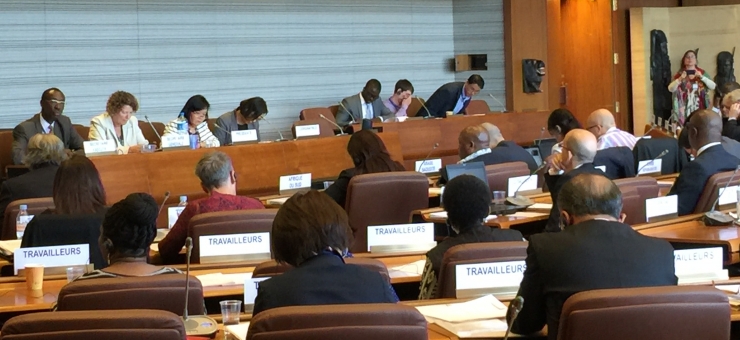Global dialogue forum at ILO examines Decent Work in retail

At a global dialogue forum hosted by the International Labour Organisation on 22-23 April, workers and employers in the global retail industry came together, along with representatives of various governments, came together to discuss how the diversification of employment relationships in the industry are impacting the International Labour Organizations (ILO) Decent Work agenda.
The ILO’s Decent Work agenda centers on the 4 strategic objectives of the ILO; Promoting jobs, guaranteeing rights at work (such as collective bargaining and union rights), extending social protections, and promoting social dialogue between employers and workers.
During the 2-day meeting, workers affiliated with UNI Global Union Commerce spoke about the increasing hostility of retail employers towards union organizing, the decline of collective bargaining and social dialogue, and the increase of employment practices such as zero-hour contracts. They also spoke about issues such as non-predictable scheduling and low pay that are undermining decent work.
As solutions to these challenges, worker delegates proposed that Global Framework Agreements and international labour standards should be vigorously promoted by the ILO, trade unions, and employers. There was a unanimous call from worker participants that government and the ILO should condemn and outlaw the practice of zero-hour contracts and that employers should recognize the growing global movement for Living Wages and commit to paying their workforce properly. Workers also strongly favoured that the ILO continue collecting and analyzing data, with particular attention to areas where there is a Decent Work deficit in the retail industry.
After difficult negotiations between worker, employer, and government participants the forum reached several points of consensus including reconfirming that all workers in the sector, including those in non-standard forms of employment are covered by international labour standards and that collective bargaining and formation of labor unions are fundamental for achieving Decent Work. Employers, workers, and governments also agreed that secure, predictable hours of work and income security are necessary for workers.
The participants also reached consensus that the conclusions of the ILO’s Triparite Meeting of Experts on Non-Standard Forms of Employment held in February of 2015 were fully relevant to the retail sector:
Workers in retail commerce in non-standard forms of employment may face a higher incidence of decent work deficits and they may face barriers to collectively address decent work deficits along one or more of the following dimensions of work: (1) access to employment and labour market transitions to decent work; (2) wage differentials; (3) access to social security; (4) conditions of work; (5) training and career development; (6) occupational safety and health; and (7) freedom of association and collective bargaining. If left unchecked, these decent work deficits risk contributing to increased insecurity and greater inequality.
And;
Non-Standard forms of employment should meet the legitimate needs of workers and employers and not be used to undermine labour rights and Decent Work.
UNI Global Union along with the ILO and employer participants will work together to implement the points of consensus that have been reached. The ILO will publish a report on the discussions and debates that occurred at this meeting along with the points of consensus that were reached.
Worker Participants
Ruben Cortina – (Workers’ Spokesperson) Faecy’s, Argentina
Maxine Gay – First Union, New Zealand
Claudio Aravena – Contracops, Chile
Dipa Bharadwaj – Unicom, Nepal
Mary Dzinyemba – CIAWU, Malawi
Shoichi Hachino – UA Zensen, Japan
Viorel Stratulat – Selgros Union, Romania
Louise Thipe – Saccawu, South Africa
Cristina d’Ambrosio – Uiltucs, Italy
Julia Fox – SDA, Australia
Daisuke Fujiyoshi – UA Zensen, Japan
Patrick O’Neill – UFCW, United States
Alvin Ramnarain – RWDSU-UFCW, United States
Angeles Rodriguez - CCOO, Spain
Manuel Sanchez – CCOO, Spain
Chris Van Droogenbroeck – LBC-NVK, Belgium
Atsuk Danjo – UA Zensen, Japan
UNI Global Union
Philip Jennings
Alke Boessiger
Yoko Ogawa
Mathias Bolton
For more information on this Global Dialogue Forum, including links to download background documents please click here:
http://www.ilo.org/sector/activities/sectoral-meetings/WCMS_337081/lang--en/index.htm

